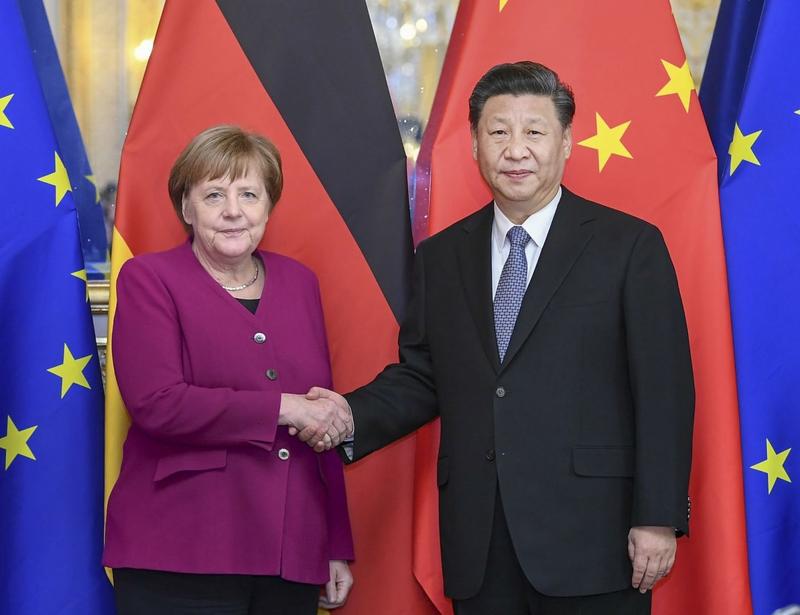WHO worried about rising COVID-19 cases in Central and South America
 President Xi Jinping meets with German Chancellor Angela Merkel on the sidelines of a global governance forum co-hosted by China and France in Paris, March 26, 2019. (PHOTO / XINHUA)
President Xi Jinping meets with German Chancellor Angela Merkel on the sidelines of a global governance forum co-hosted by China and France in Paris, March 26, 2019. (PHOTO / XINHUA)
China stands ready to work with Germany and the European Union to strengthen strategic cooperation, uphold multilateralism, tackle global challenges, and jointly add certainty to the current world of uncertainty, President Xi Jinping said on June 3.
In a telephone conversation with German Chancellor Angela Merkel, Xi noted it was the third time since the onset of the COVID-19 outbreak that he and Merkel had spoken over the phone, which reflects the deep political mutual trust and close strategic communication between the two sides.
Xi said China is ready to work with Germany to support the work of the World Health Organization, promote international cooperation within such frameworks as the United Nations and the Group of 20, help African countries fight the coronavirus disease, and contribute to safeguarding global public health security.
Stressing the need to coordinate epidemic control and economic and social development, Xi said the general trend of the Chinese economy toward stable long-term growth with a sound momentum remains unchanged.
China, he added, will stay committed to further opening up to and expanding cooperation with the rest of the world, and continue to create a favorable environment for German enterprises to increase investment in China.
The recently launched China-Germany “fast track” arrangement will help enterprises in both countries to speed up business resumption, and maintain the stability of international industrial and supply chains, he said.
Noting that Germany is to take over the rotating presidency of the European Union for the second half of this year, he added that China appreciates Germany’s willingness to actively promote the development of China-EU ties.
As a series of significant events of China-Germany and China-EU political exchanges are now under discussion, China is willing to keep close communication and coordination with Germany and the EU to ensure the success of these events and lift China-Germany and China-EU relations to higher levels, he added.
For her part, Merkel said Germany attaches importance to the economic and social development plan made in China’s “two sessions”, and stands ready to work with China to promote work and production resumption without compromising outbreak control and continuously deepen bilateral economic cooperation.
Germany highly appreciates the announcement made by Xi that China’s COVID-19 vaccine will be made a global public good, she said, adding that under current circumstances, to enhance international solidarity and multilateralism is crucial to the global fight against the pandemic.
The chancellor said Germany is willing to strengthen exchanges with China and continue to support the WHO playing its important role, so as to promote international public health security cooperation.
In Geneva, WHO Director-General Tedros Adhanom Ghebreyesus on June 3 said his organization is especially worried about Central and South America, where many countries are witnessing accelerating epidemics.
He said during a virtual press conference that more than 100,000 cases of COVID-19 had been reported to the WHO for each of the past five days, and the Americas continues to account for the most cases.
“For several weeks, the number of cases reported each day in the Americas has been more than the rest of the world put together,” he said.
According to WHO figures, globally as of June 3 there had been 6,287,771 confirmed cases of COVID-19, including 379,941 deaths, reported to the WHO.
The United States remains the country hardest hit by the virus, with a total of 1,798,330 confirmed cases and 105,008 deaths reported to the WHO as of June 3. Brazil, second on the list in terms of confirmed cases, had reported 555,383, with 31,199 deaths.
Brazil on June 2 registered 28,936 new cases of the novel coronavirus and 1,262 deaths. Yet authorities have been rapidly loosening restrictions in recent days, despite daily new cases continuing to grow in most regions of the country and warnings from the WHO and epidemiologists.


